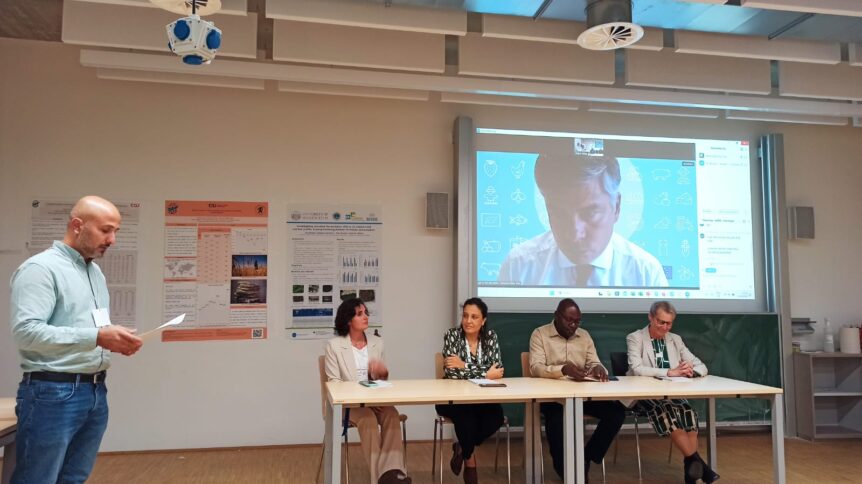Key insights and challenges for sustainable intensification in Africa: Addressed and emerging issues, and future steps
Sustainable agriculture in Africa is at a crossroads, with new approaches and technologies offering hope for the future. At the recent Tropentag Conference at BOKU University in Vienna, five EU-funded Horizon-2020 projects—Soils4Africa, SustInAfrica, EWA-BELT, UPSCALE, and SustainSahel—came together to discuss their findings and explore pathways for the sustainable intensification of food production on the continent. Here’s a snapshot of the key insights, challenges, and opportunities shared during the event.

The opening address: Collaboration for a sustainable future
Antonio Malta Reis from the European Commission’s Directorate-General for Agriculture and Rural Development (DG Agri) set the stage by highlighting the importance of AU-EU partnerships in fostering agricultural innovation. As Africa’s population grows, so does the urgency to address food security while respecting environmental boundaries. The Horizon-2020 projects showcased during this event aim to tackle exactly that—providing tools and strategies for sustainable intensification in diverse African contexts.
“Sustainable intensification is an approach using innovations to increase productivity on existing agricultural land with positive environmental and social impacts. Both words, “sustainable” and “intensification,” carry equal weight.”

A showcase of EU-funded projects: Innovations and early results
Dr. Giles Young (SustInAfrica) provided an overview of the five featured projects, each with a unique focus but united by a common goal: boosting productivity through agroecological principles and innovative technologies.
- EWA-BELT is exploring crop-livestock integration and pest control strategies in East and West Africa. Early trials indicate the potential to improve livestock weight and crop productivity, with farmers in Burkina Faso rediscovering traditional pest control methods such as the use of Cassia nigricans as an insecticide.
- UPSCALE is advancing the Push-Pull technology, a technique that combats Striga, stemborers, and fall armyworm—all while improving soil fertility. The trials have shown great promise, especially in the face of climate challenges, with farmers across five countries benefiting from this sustainable pest control strategy.
- SustainSahel focuses on the synergistic use of crops, shrubs, and livestock in the Sahel region. Early findings show that improved feeding strategies and mulching with tree leaves from various tree and shrub species can increase water infiltration and soil organic matter, improving both crop and livestock productivity in a challenging environment.
- Soils4Africa is creating an open-access Soil Information System by systematically collecting soil samples across Africa. The goal is to provide critical data for decision-making, with over 6,700 samples already collected from 49 countries. This will be instrumental for scaling sustainable farming practices continent-wide.
- SustInAfrica has seen significant results from agroecological practices in olive cultivation in Tunisia, including a 40% increase in yield. In Ghana, a drought-risk prediction model for mango plantations is being developed, combining smart farming tools with real-time data for better farm management.
Challenges in scaling agroecological and other innovations
While the projects have made significant advances, scaling innovations remains a formidable challenge. Prof. Dr. Emily Poppenburg (UPSCALE) emphasized that technology adoption is not linear. For example, the Push-Pull strategy may be adopted partially or in phases, with farmers sometimes discontinuing its use and returning to it later based on circumstances.
Generally, one of the biggest hurdles is the so called “project syndrome”—the tendency for adoption rates to drop after a project ends. Short-term projects often lack the capacity for long-term follow-up, which is crucial for sustainable implementation. Even when innovations are integrated into state extension services, there are often insufficient funds for ongoing support and backstopping.
A call for long-term solutions and coordinated efforts
The panel highlighted the need for institutional support and coordinated messaging. Disjointed incentives and fragmented communication strategies can confuse farmers, limiting the effectiveness of interventions. Co-designed innovations, though crucial for community buy-in, are not sufficient by themselves for widespread scaling. A more community-based approach is needed to complement individual training and traditional dissemination methods.
Looking ahead: The path to sustainable intensification
The event concluded with a strong message: sustainable intensification in Africa is possible, but it requires a holistic approach that recognizes the complexity of local contexts and farming systems. The ongoing dissemination of co-designed innovations is a promising start, but without long-term public investment and a clear strategy for scaling, many of these innovations may not realize their full potential.
As we look to the future, it’s clear that sustainable farming is not a one-size-fits-all solution. Instead, it requires a portfolio of strategies tailored to diverse agricultural landscapes, from the Sahel to East and West Africa. The Horizon-2020 projects offer valuable lessons for policymakers, researchers, and farmers alike, reminding us that the journey to sustainability is a shared and evolving process.
What’s next? A stronger focus on community-driven dissemination, long-term funding, and collaborative research could help ensure that the insights gained from these projects will continue to shape the future of African agriculture long after the projects themselves conclude.
Further information

